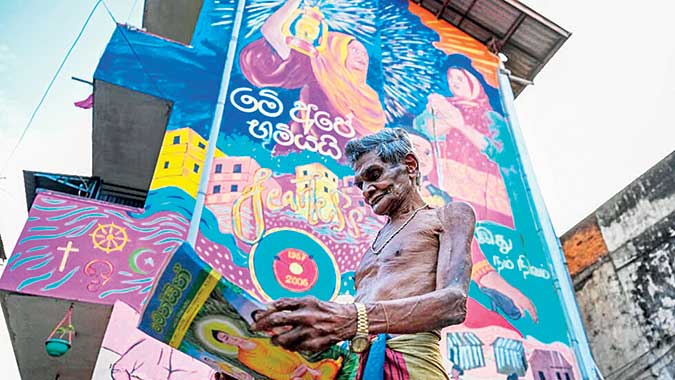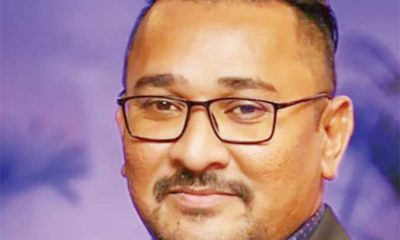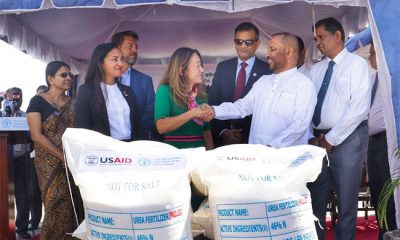News
A year after Sri Lanka unrest, Slave Island hungers

By Amal JAYASINGHE
As Sri Lankans flocked to a jubilant street party celebrating their president’s ouster, retired accountant Milton Perera sat at home pondering whether his family could afford to eat the next morning.Before his dramatic toppling last year, Gotabaya Rajapaksa was blamed for an economic crisis that brought food and fuel shortages, blackouts and runaway inflation to the island nation.
But Perera told AFP at the time that with the once-loved leader out of office, the hardships his country had endured to that point would get worse.A year later, with millions of his compatriots struggling to put enough food on the table, the 75-year-old says his prediction has proved correct.
“Last year we had money, but no goods,” Perera told AFP inside his rundown government flat, a short distance from the seafront protest site where Rajapaksa’s toppling was orchestrated last year.
“Now there are goods, but we don’t have money.”
His home in Slave Island — a working-class pocket of Colombo where the Portuguese housed African slaves during the colonial period — is damp from a leaking water main.
Municipal authorities have not come around to repair it because they no longer have money for maintenance.With sunken cheeks and veins protruding from his gaunt limbs, Perera wheezes as he moves gingerly around his kitchen, the product of his chronic asthma.
Before the crisis, medication to treat his condition was provided free by public hospitals — a government programme that has now been scrapped.Two months ago Perera’s welfare payments were stopped as part of other spending cuts, meaning he is no longer able to afford an inhaler to treat his symptoms.
His family’s water and electricity bills have doubled thanks to the removal of government utility subsidies.The economic crisis had already forced Perera, his wife, his two children and their extended families to regularly skip meals when AFP first visited their home.A year later, supermarkets are again fully stocked with the kitchen staples that disappeared from the shelves during last year’s chronic shortages — but Perera’s family can’t buy them.
“We can’t afford meat, fish and eggs,” B. M. Pushpalatha, Perera’s wife, told AFP as the couple shared an unadorned meal of rice and lentils. “They are too expensive.”
Sri Lanka defaulted on its $46 billion foreign debt in April 2022 as its economy went into a tailspin unprecedented in its history as an independent nation.Petrol queues at pumping stations stretched for miles and motorists — several of whom died in queue — spent days waiting to top up their tanks.
Families had no gas to cook food, farm yields fell dramatically due to a ban on fertiliser imports, and hospitals were empty of life-saving pharmaceuticals.Months of angry protests culminated in the July 9 storming of Rajapaksa’s presidential palace, a short walk from Perera’s home, with its occupant forced into a brief but humiliating exile.
Rajapaksa’s departure did not conclude Sri Lanka’s economic woes, with inflation peaking at 70 percent in September. Petrol rationing also remains in force.His successor Ranil Wickremesinghe secured a $2.9 billion IMF bailout in March by agreeing on a tough austerity regimen to plug the country’s black hole of debt.
“Many of the decisions I have been compelled to take since assuming the presidency have been unpopular,” Wickremesinghe said in a February address to the nation.
“However, because of those decisions, today no citizen of this country will die of dehydration in oil queues. You won’t starve without gas or fertiliser.”
But the steep cuts to government spending and welfare programmes have exacerbated hardship across the country.An additional four million Sri Lankans had fallen below the poverty line since the crisis began, said Dhananath Fernando, chief executive of the Colombo-based Advocata Institute think-tank.
“That means about seven million people in a country of 22 million are earning less than 14,000 rupees ($46) a month,” he told AFP.Of those, nearly four million Sri Lankans did not have the means to adequately feed themselves, the United Nations said in June.
Fernando said the figures showed a sharp deterioration in living standards across the country in the past year with no prospect of a quick recovery.Unless the austerity measures began to bear fruit, the island risked a return to the sustained social unrest that broke out last year, he added.
“If we really fail to take Sri Lanka to a growth trajectory in the future, I’m not completely ruling it out,” Fernando said.
News
US sports envoys to Lanka to champion youth development

The U.S. Embassy in Colombo welcomed the U.S. Sports Envoys to Sri Lanka, former National Basketball Association (NBA) and Women’s National Basketball Association (WNBA) players Stephen Howard and Astou Ndiaye, from June 8 through 14.
The Public Diplomacy section of the U.S. Embassy said that it would launch a weeklong basketball program intended to harness the unifying power of sports, made possible through collaboration with Foundation of Goodness and IImpact Hoop Lab.
While in Sri Lanka, Howard and Ndiaye, both retired professional basketball players, will conduct a weeklong program, Hoops for Hope: Bridging Borders through Basketball. The Sports Envoys will lead basketball clinics and exhibition matches and engage in leadership sessions in Colombo and Southern Province for youth aged 14-18 from Northern, Uva, Eastern and Western Provinces, offering skills and leadership training both on and off the court. The U.S. Envoys will also share their expertise with the Sri Lanka Basketball Federation, national coaches, and players, furthering the development of basketball in the country. Beyond the clinics, they will collaborate with Sri Lankan schoolchildren to take part in a community service project in the Colombo area.
“We are so proud to welcome Stephen and Astou as our Sports Envoys to Sri Lanka, to build on the strong people-to-people connections between the United States and Sri Lanka,” said U.S. Ambassador Julie Chung. “The lessons that will be shared by our Sports Envoys – communication, teamwork, resilience, inclusion, and conflict resolution – are essential for leadership development, community building, equality, and peace. The U.S. Sports Envoy program is a testament to our belief that sports can be a powerful tool in promoting peace and unity.”
News
Rahuman questions sudden cancellation of leave of CEB employees

SJB Colombo District MP Mujibur Rahuman in parliament demanded to know from the government the reasons for CEB suspending the leave of all its employees until further notice from Thursday.
MP Rahuman said that the CEB has got an acting General Manager anew and the latter yesterday morning issued a circular suspending leave of all CEB employees with immediate effect until further notice.
“We demand that Minister Kanchana Wijesekera should explain this to the House. This circular was issued while this debate on the new Electricity Amendment Bill was pending. There are many who oppose this Bill. The Minister must tell parliament the reason for the urge to cancel the leave of CEB employees,” the MP said.However, Speaker Mahinda Yapa Abeywardena prevented Minister Wijesekera responding to the query and said that the matter raised by MP Rahuman was not relevant.
News
CIPM successfully concludes 8th Annual Symposium

The Chartered Institute of Personnel Management (CIPM) successfully concluded the 8th Annual CIPM Symposium, which took place on 31st May 2024. Themed “Nurturing the Human Element—Redefining HRM in a Rapidly Changing World,” the symposium underscored the pivotal role of human resource management (HRM) in today’s dynamic global landscape. Since its inception in 1959, CIPM has been dedicated to advancing the HR profession through education, professional development, and advocacy, solidifying its position as Sri Lanka’s leading professional body for HRM.
Ken Vijayakumar, the President of the CIPM, graced the occasion as the chief guest. The symposium commenced with the welcome address by the Chairperson, Prof. Arosha Adikaram, followed by the Web Launch of the Symposium Proceedings and Abstract Book by the CIPM President. The event featured distinguished addresses, including a speech by Chief Guest Ken Vijayakumar, President of CIPM, and an address by Guest of Honor Shakthi Ranatunga, Chief Operating Officer of MAS Holdings Pvt. Ltd., Sri Lanka.
The symposium also featured an inspiring keynote address by Prof. Mario Fernando, Professor of Management and Director of the Centre for Cross Cultural Management (CCCM) at the University of Wollongong, Australia.
Vote of Thanks of the inauguration session was delivered by Dr. Dillanjani Weeratunga, Symposium Co-chair.
The symposium served as a comprehensive platform for researchers to present their findings across a wide range of critical topics in HRM. These included Cultural Diversity and Inclusion, Talent Development and Retention, Ethical Leadership and Corporate Social Responsibility, Adapting to Technological Advancements, Mental Health and Well-being at Work, Global Workforce Challenges, Employee Empowerment, and Reskilling and Upskilling.
The plenary session was led by Prof. Wasantha Rajapakse. Certificates were awarded to the best paper presenters during the valedictory session, followed by a vote of thanks delivered by Kamani Perera, Manager of Research and Development.
The annual symposium of CIPM was a truly inclusive event, attracting a diverse audience that spanned undergraduates, graduates, working professionals, research scholars and lecturers. This widespread interest highlights the symposium’s significance in the field of HRM, offering a unique opportunity for everyone to network and learn from scholarly brains.The CIPM International Research Symposium was sponsored by Hambantota International Port, Sri Lanka Institute of Information Technology (SLIIT), E B Creasy & Co. PLC, and Print Xcel Company.
















